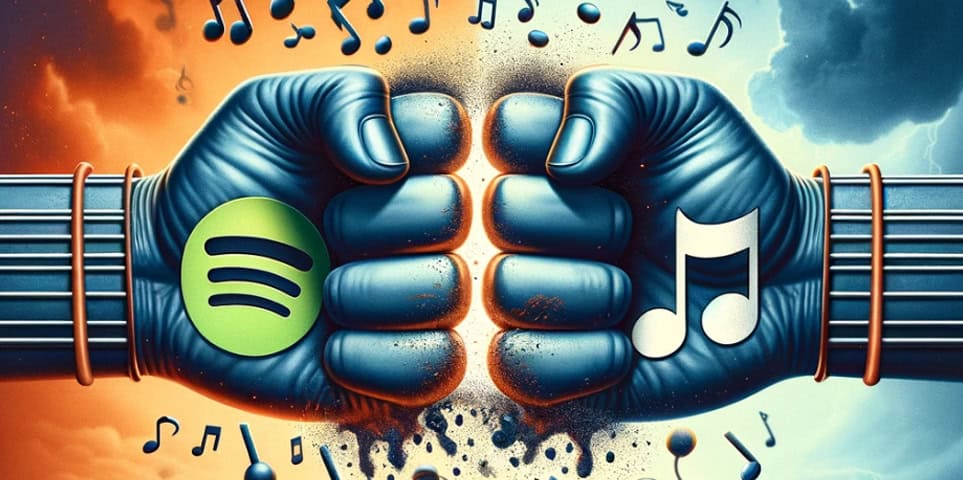What’s Happened?
The music publishing community gathered in London on May 23rd to celebrate songs and songwriters at the annual Ivors Awards. This year’s event was particularly special, with Bruce Springsteen becoming the first international songwriter in The Ivors Academy’s 80-year history to be awarded its highest honor: the Fellowship. He joins an elite group of songwriting legends including Sir Paul McCartney, Kate Bush CBE, Joan Armatrading CBE, and Sting, the 2023 recipient.
Bernie Taupin, known for his successful songwriting partnership with Sir Elton John, was also recognized with the Ivor Novello for Outstanding Contribution to British Music.
Despite the celebratory mood, a contentious topic loomed large: the ongoing feud between US music publishers and Spotify. This dispute stems from Spotify’s decision to reclassify its Premium tiers as ‘bundles,’ combining music and audiobooks, which results in paying a lower mechanical royalty rate to publishers and songwriters.
The Back Story
To understand how Spotify pulled off this controversial move, we need to rewind to 2022. In August of that year, the United States Copyright Royalty Board (CRB) accepted a settlement to improve songwriters’ streaming royalty rates in the US from January 1, 2023, known as ‘Phonorecords IV’ or ‘CRB IV’. This settlement would see songwriters and music publishers paid a headline rate of 15.35% of a given interactive streaming service’s US revenue by 2027.
However, this settlement included a provision allowing ‘bundle’ services in the US to pay a lower mechanical royalty rate. Spotify’s reclassification of its Premium plans as bundles, due to the inclusion of 15 hours of free audiobooks, has triggered this lower rate.
The Controversial Bundling Strategy
Spotify’s decision to bundle audiobooks with its Premium music subscription plans has sparked significant controversy. By offering 15 hours of free audiobooks with its Premium plans, Spotify has reclassified these plans as bundles. This reclassification has allowed Spotify to reduce the mechanical royalty rate it pays to songwriters and publishers in the US. The rationale is that bundles, which combine multiple types of content, are subject to different (and often lower) royalty rates than standalone music subscriptions.
This strategic move by Spotify has far-reaching implications. On the surface, it appears to be a value-add for subscribers, offering more diverse content for the same price. However, for songwriters and publishers, this translates to reduced income, as their share of the revenue pie shrinks. The mechanical royalty rate for bundled services is lower, meaning less money flows to the creators of the music.
Reactions from Publishers
Music publishers are not pleased. When Spotify first announced this reclassification on April 18, David Israelite, President & CEO of the National Music Publishers Association (NMPA), criticized Spotify for attacking the very songwriters who make its business possible.
Jon Platt, Sony Music Publishing Chairman & CEO, echoed this sentiment in a letter to SMP songwriters and composers, revealing that their mechanical royalty payments from Spotify have been reduced by approximately 20%.
Legal Conflicts
As predicted, Spotify’s actions have led to litigation. The US-based Mechanical Licensing Collective (MLC) sued Spotify for allegedly underpaying royalties to songwriters and publishers due to this reclassification. The MLC claims that Spotify unilaterally and unlawfully decided to reduce the reported revenue for Premium by almost 50%.
Are you ready to unleash your music bull?
Industry Reactions and Potential Changes
On May 21, the NMPA called on Congress to update the US copyright law to allow publishers to negotiate in a free market, similar to record labels. This proposal was met with resistance from DiMA, which represents services like Spotify, Amazon, and Pandora. DiMA’s President & CEO Graham Davies emphasized the importance of the statutory blanket license established by the Music Modernization Act (MMA) and criticized the NMPA’s proposal.
A Final Thought
This is not Spotify’s first major dispute with songwriters and publishers in the US. In 2019, Spotify and other streaming services were ordered to increase mechanical royalty rates under the ‘CRB III’ process. Despite initiatives like the Songwriters Hub and promotional tools for songwriters, Spotify’s latest move has further strained relationships with the songwriting community.
As the Ivors’ celebration wraps up, Spotify’s battle with songwriters and publishers continues to unfold, with potential implications for the entire industry. A resolution remains to be seen, but the importance of songwriters in the music-making process cannot be overstated.




